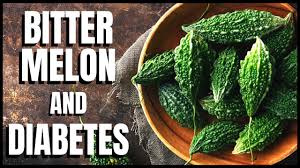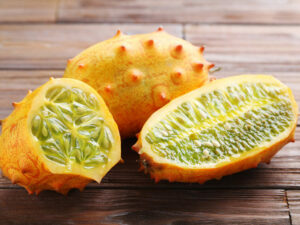Contents
All About Bitter Melon
Bitter melon, also known as bitter gourd or Momordica Charantia, is a tropical fruit that has several health advantages. You can either eat or make juice of bitter melon (also known as karela juice), or brewed into tea. It is a green, oblong-shaped fruit with a unique warty skin that grows off the vine.
It also contains high vitamins and minerals. Therefore, it is good for health. Its size, texture, and bitterness vary depending on where it grows. Bitter melons are found in tropical and subtropical climates of countries, such as:
- South America
- Asia
- Parts of Africa
- The Caribbean
It also reduces blood sugar levels, which could help with diabetes therapy and thus facilitate diabetic treatment. Its extracts are also commonly accessible as nutritional supplements. You may use bitter melon as an alternative or supplemental treatment.
Nutritional Value of Bitter Melon
Bitter melon, which is both a fruit and a vegetable, is high in vitamins A and C, as well as iron. For medical purposes, some doctors use bitter melon for their research.
100 grams of raw bitter melon contains:
- Total Calories – 16
- Dietary Fiber – 2.6 g
- Carbohydrates – 3.4 g
- Fats – 158 mg
- Water – 87.4 g
- Protein – 930 mg
Bitter Melon And Diabetes

Researchers are still studying the connection between Bitter melon and diabetes. It helps in the reduction and management of blood sugar levels.
This is because it contains characteristics that act like insulin, which helps in the transport of glucose into cells for energy.
The melon ingestion can help your cells in utilizing glucose and transport it to your liver, muscles, and fat.
The melon may also be able to help in the retention of nutrients by preventing their conversion to glucose in the bloodstream.
However, many studies hat yet not approved treatment or prescription for prediabetes or diabetes. Before utilizing any type of melon for diabetes treatment, most experts advise doing more studies. Two research on bitter melon and diabetes are done by experts as:
- There is a need to do more research on how to use nutrition therapy.
- The efficiency of melon in combination with a common diabetes medication reduces fructosamine levels in type 2 diabetes.
- However, it is less effective than a lower dose of an existing drug.
Moreover, there is a need to find out how it affects type 2 diabetes. Presently, there is no medical technique to use as a diabetes treatment. Hence, you can use this melon as part of a well-balanced diet. Taking bitter melon beyond your diet could be dangerous.
Health Benefits of Bitter Melon
Bitter melon has several significant health benefits in addition to its flavour and striking appearance. This melon and its extract have six health benefits.
Key Source of Several Nutrients
Bitter melon is also high in antioxidants like catechin, gallic acid, epicatechin, and chlorogenic acid. It can help or protect your cells from damage. A cup of bitter melon is full of various nutrients. It provides nutrients as:

- Calories: 20
- Vitamin C: 93%
- Carbs: 4 grams
- Fibre: 2 grams
- Potassium: 8% of the RDI (Reference Daily Intake)
- Vitamin A: 44% of the RDI
- Zinc: 5% of the RDI
- Folate: 17% of the RDI
- Iron: 4% of the RDI
Vitamin C, an important micronutrient that helps in preventing diseases, develops calcium in bones, and facilitates wound healing. Once can find Vitamin C in bitter melon in abundance. It also contains vitamin A, which is a fat-soluble vitamin that helps in improving skin health and vision.
Helps In Reducing Blood Sugar
Many indigenous communities use bitter melon to treat diabetes-related diseases due to its powerful therapeutic characteristics. In recent years, it has been found that fruits have been involved in the regulation of blood sugar to a great extent. The outcomes of the research include:

Taking 2,000 mg of bitter melon daily for three months reduces blood sugar and hemoglobin A1c.
It also improves the way our metabolism uses sugar in the cells and boosts insulin release. However, human research limits to a larger, higher-quality study that appears to learn more about how bitter melon affects blood sugar levels in the general population.
Cancer-Fighting Properties

According to research, bitter melon includes chemicals that have anti-cancer potential. One test-tube study, for example, found that its extract was effective in destroying cancer cells in the stomach, colon, lung, and nasopharynx (the area behind the nose at the back of your throat).
This extract helps by inhibiting the growth and spread of breast cancer cells while simultaneously causing the cancer cells to damage in another test tube.
However, keep in mind that these experiments were conducted on individual cells in a laboratory using strong doses of its extract. However, more research is still needed to see how bitter melon affects cancer growth and development in humans when ingested in normal meal quantities.
Decreases Cholesterol Levels

High levels of cholesterol can cause fatty plaque to build up in your arteries. It forces your heart to work harder to pump blood and increasing your risk of heart disease.
Bitter melon, in this case, helps in lowering cholesterol levels in animals, which may help to promote overall heart health. An association tested the bitter melon extract on rats to find high cholesterol levels.
Accordingly, it resulted in considerable reductions in total cholesterol, “bad” LDL cholesterol, and triglycerides.
Despite this, most current research on this melon, a putative cholesterol-lowering benefit found in animal trials involving massive dosages of its extract. Hence, researchers need to see if the same effects occur in humans who consume it as part of a balanced diet.
Facilitates Weight Loss
Bitter melon is low in calories but high in fiber, making it a perfect complement to a weight-loss diet. Each one-cup (94-gram) meal provides approximately 2 grams of fiber. Fiber takes a long time to move through your digestive tract.

- It helps you feel fuller for longer and reduces hunger and appetite. As a result, substituting bitter melon for higher-calorie items may help you boost your fiber consumption. Moreover, lowering your calorie intake will result in weight loss.
- It has also been shown to help in fat burning in several studies.
- In one trial, taking a pill containing 4.8 grams of bitter melon extract once a day results in considerable abdominal fat reduction. After seven weeks, participants come down to an average of 0.5 inches (1.3 cm) from their waist circumference.
Delicious And Versatile

Bitter melon has a strong flavour that complements a variety of cuisines. It can be cooked in a variety of ways or can be eaten raw. To make it, first, wash the fruit and cut it in half lengthwise.
After that, scoop out the seeds from the middle with a spatula and cut the fruit into thin slices. You can also hollow out and load with your favourite fillings after being pan-fried, steamed, or baked.
Side Effects Of Bitter Melon
Bitter melon on a short-term basis seems to be safe. But sometimes it may contain side effects to some people who prefer taking it for prolonged durations. It has the following side effects:
- Diarrhoea and abdominal pain
- Headache, fever, and coma symptoms (with excessive ingestion of the seeds)
- Low blood sugar gets worse (hypoglycemia)
- Upset stomach
- Cramping
Risks And Complications Of Bitter Melon
Bitter melon should be used in moderation in your diet. It might have negative side effects and negative interactions with other drugs. Some of the risks and complications of bitter melon include:
- Liver damage
- Favism, which causes anaemia
- Vaginal bleeding, contractions, and abortion
- Vomiting, diarrhoea, and other intestinal issues
- Lowering of blood sugar, if insulin is taken
- Problems in controlling blood sugar, for those who had recent surgery
Precautions Of Bitter Melon
Prevention is always better than cure. It will be better for you if you acquire all the knowledge before consuming it. The below-given points accommodate all the possible precautions that one should take before consuming it:
- When consumed by mouth, it is possibly safe for most people (up to 4 months). It might make some people feel nauseous. The long-term safety of bitter melon use is unknown.
- When consumed by mouth during pregnancy, it is possibly unsafe. There isn’t enough information on the safety of eating bitter melon when breastfeeding. To be on the safe side, avoid using it.
- It contains compounds that might cause menstrual bleeding and miscarriage in animals.
- Blood sugar levels are lower in people who eat bitter melon regularly. If you have diabetes and take blood sugar-lowering drugs, adding this melon to your diet can cause your blood sugar to drop too low. Keep a close eye on your blood sugar levels.
- After ingesting these seeds, people with G6PD deficiency may get “favism.” Favism is a disease called after the fava bean that causes “tired blood” (anaemia), headaches, fevers, stomach pains, and coma in some people. These seeds contain a chemical that is similar to fava bean compounds. Bitter melon should be avoided if you have a G6PD deficiency.
- Researchers suspected its interference with blood sugar management during and after surgery. It should be avoided for at least two weeks before a scheduled surgery.
Best Ways To Consume Bitter Melon
You can consume bitter gourd in several different ways. It’s simple to incorporate bitter gourd into your everyday diet. Also, you can eat it as raw as a salad, mixed into a pleasant beverage, or make bitter gourd tea.
Recipe 1: Bitter Gourd Tea
Ingredients:
- 3-4 bitter gourd slices (no seeds) or leaves
- 200 millilitres of water
- Natural sweeteners such as honey or agave syrup (optional)
Method:

- Fill a tea pan halfway with water and bring to a boil.
- 10 minutes on medium heat to boil water.
- Place the bitter gourd slices in the boiling water and mix well to ensure that all of the nutrients are dissolved.
- Turn off the heat, add the honey, and set it aside for a few minutes.
- Filter the contents with a strainer.
- Serve hot.
Recipe 2: Stir-Fried Bitter Gourd
Ingredients:
- 1 tablespoon olive or vegetable oil
- Bitter gourds, sliced (seeds removed)
- 3–4 cloves of garlic
- 1 tomato finely chopped, finely chopped 1 small onion
- Two eggs
- Powdered pepper
- Salt to taste
Method:

- Preheat the burner, lay a saucepan on top, and pour in the oil.
- In the same pan, add finely diced onion and crushed garlic cloves.
- Stir the ingredients until it reaches a medium-brown consistency.
- Now add the chopped tomatoes to the pan and give it a good swirl.
- Add the sliced bitter gourd to the pan after 2-3 minutes of stirring.
- Cook until the contents are transparent, for about 15 minutes.
- Two eggs should be whisked together and poured into the pan.
- Stir constantly until the eggs are fully cooked.
- Remove the pan from the heat and season the contents with salt and pepper.
- Serve it plain or with noodles or rice.
Conclusion
The above article will help you to know about the benefits of bitter melon and its negative impacts too. It also provides recipes for diabetics for their betterment. Also, learn all the precautions that diabetics should take while having it.
Do you want to get rid of diabetes? Join our online diabetes consultation program and reverse Diabetes naturally through lifestyle changes such as a Personalized Diet plan, Exercise, Yoga, dieticians, and health coaches.


